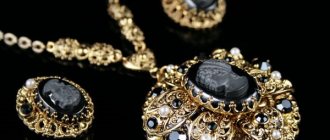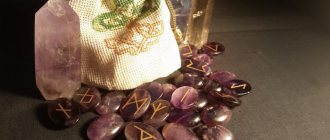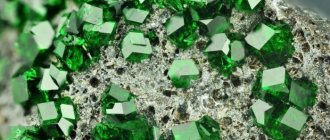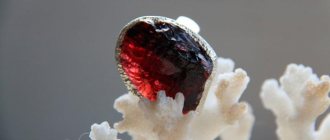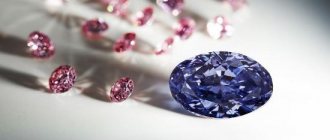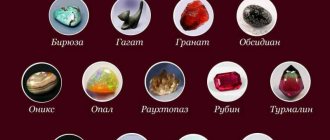Astrologers suggest people to wear some gemstones together and prohibit it for others due to their celestial powers.
According to astrologers, the gemstones worn together should be based entirely on the friendly planets. People should wear two stones at the same time if the planets representing them are in a favorable relationship. On the other hand, if the stones represent conflicting planets, then they should not be worn at the same time.
Each planet belongs to a specific gemstone, in other words, each mineral has the power of its representative Planet. Rubies belong to the Sun, emeralds to Mercury, blue sapphires belong to Saturn, and yellow sapphires belong to Jupiter. Venus is responsible for diamonds, Mars loves red corals, and the Moon prefers pearls and all milky white stones.
Stones also have character
Stones, as part of the ecosystem, are considered by science to be inanimate nature. But adherents of the paranormal are sure: each gem is endowed with its own character.
Astromineralogists believe that minerals are in tune with the elements - Water, Air, Earth, Fire:
- Airy ones are translucent, with a bit of heterogeneity, haze, and impurities.
- Almost all representatives of Fire are transparent and pure.
- Water gems are translucent and of medium hardness; These are all stones of marine origin (coral, pearls).
- "Earthlings" are solid and opaque.
The doctrine of the combination of precious minerals was developed by the sages of Ancient India. A classic Indian artifact is the navara. This is an accessory made of nine stones with different characteristics (but not warring). Each one represents a planet of the solar system and is endowed with part of its power. As a result, their total magical power increases exponentially. The owner of the jewelry receives bonuses in the form of health, luck, and personal happiness.
Description, production
Agate is a type of quartz, which is an aggregate of chalcedony and thin fibers. It is distinguished by a layered structure and a stepped arrangement of colors (layering). Agates also include all gems that do not have layering, but contain some inclusions that give certain contours: mossy, star-shaped and others.
The palette of mineral shades can be very diverse: orange, blue, red, yellow, brown, purple and others. But all stones are characterized by the presence of stripes distributed zonally. By type of pattern there are dotted, ruined, spectacled, striped, spherical, landscape, mosaic and bastion. And it cannot be said that the shades and type of striping of the gem are limited to this. There is a huge variety of agate, which is simply impossible to list: onyx, moire, iridescent, flame, cloud, jasper agate, chrysocolla, porcelain, cer-agate and others.
As for hardness, like all quartz, agate received a 7 on the Mohs scale, which means that in terms of this characteristic it is second only to diamond and corundum.
The shine of a natural gem is not bright, but matte and greasy. But after polishing you can achieve a glassy sheen. The transparency of the mineral is not pure. It may be slightly translucent, but it is essentially an opaque stone because the density of color fills its entire structure.
In nature, crystals form very often, and finding it is not so difficult. By its origin it belongs to volcanic rocks. It can be found not only in frozen lava cavities, but also on mountain slopes, in sea pebbles or in old deposits of valuable rocks. Gem deposits can be found all over the world:
- Russia;
- Crimean peninsula;
- Georgia;
- Armenia;
- Brazil;
- Mongolia;
- India;
- Germany;
- Ukraine.
Story
Today it is no longer possible to know exactly where the name of the mineral came from. According to the teachings of Pliny the Elder, it was named after the Achates River in Sicily. And according to another version, “agate” in translation means “kind”, “good”, “happy”.
The stone has been known for more than 6,000 years and in every era it has been given great importance. At one time it was considered the “eye of the Creator,” which monitors the actions of people, then it served as a talisman against vampires and evil spirits. But one thing always remained base: agate was respected, endowed with special superpowers, it became a talisman for emperors, kings, and celebrities.
Legends and beliefs are associated with the mineral, the authenticity of which can no longer be verified. It is believed that the Holy Grail is agate.
In addition, not only jewelry was made from stone. In Ancient Greece, images of rulers were cut out of it, and the characteristic striping only added expressiveness to such products.
It is known that Catherine the Great preferred products with this mineral. She did not hesitate to wear discreet agate beads, which were given to her by an ordinary girl, in gratitude for her dowry.
Why is their “relationship” important for humans?
In astrology, the compatibility of minerals with each other is based on the thesis of harmony or antagonism (hostility) of the elements and planets. Everything is like people.
The compatibility of gemstones of the first row is especially problematic. Diamond, sapphire, ruby, alexandrite can hardly be tolerated by their neighbors.
Therefore, when choosing jewelry, it is worth considering the compatibility of some stones with others:
- The elements of a person and a gem must coincide or be combined.
- Stones of the same element enhance each other's effect.
- It is forbidden to wear minerals of the opposite zodiac sign.
- Gems of antagonistic elements cannot be worn together in an accessory or outfit.
An Air person can wear Fire stones, while an “Earthman” can wear Water minerals.
They are at odds with each other:
- Fire - Earth. The fire will suppress the earthling. In response, he will take revenge or simply “close down.” That is, as a magical artifact it will become useless.
- Fire water. Water extinguishes Fire, but it evaporates.
- Air - Water. They create an intersection of vibrations that is uncomfortable for the owner.
Stones cannot be worn at random. Their compatibility in jewelry is especially important.
By putting on a necklace, bracelet or earrings, a person becomes involved in the relationship between gems at the energy-informational level. If compatibility is negative, the energy gets confused and becomes chaotic. A “beating” effect occurs. And the owner gets problems - he gets sick or becomes unlucky.
Metal selection
It is important not only to choose the right stones that will coexist with the amethyst, but also to choose the appropriate metal for the setting. At the same time, they are guided by aesthetic considerations, their own taste and energy compatibility. Lithotherapists and jewelers give the following advice on this matter:
- Amethyst is neutral when combined with yellow gold. All its magical and healing properties will be absorbed by the metal. To avoid this, you can choose a product that combines quartz with rock crystal, diamonds, and aquamarine.
- Silver is the best option for a frame. Metal enhances the positive effect of the stone, creating a powerful protective talisman.
Having studied the compatibility features of minerals, you can create safe options that will attract good luck and happiness into the life of their owner and protect them from negativity. Amethyst is not one of the aggressive stones, so the wrong combination does not bring serious consequences. Astrologers advise wearing purple or rose quartz with topaz, turquoise, agate, and rock crystal.
How to find your stones
The number of mineral samples is in the hundreds. To organize them from a magical point of view, astrologers, gemologists and jewelers have developed a compatibility table.
It’s convenient and easy to work with:
- Find a gem that matches your zodiac sign.
- From the list of minerals compatible with it, those that are also suitable according to the recommendations of astrologers are selected.
- You can choose neutral options, that is, not prohibited by the horoscope.
A table of zodiac signs and their corresponding talisman stones according to the horoscope, so that in the future it will be easier to determine the compatibility of minerals with each other.
| Date of Birth | Zodiac sign | Stone |
| March 21 – April 20 | Aries | agate, amethyst, garnet, pearl, diamond, ruby, serpentine, carnelian, hawkeye and jasper |
| April 21 – May 21 | Taurus | emerald, onyx, rose quartz, ruby, carnelian, jasper, malachite, agate, chrysoprase, aventurine |
| May 22 – June 21 | Twins | sapphire, agate, jasper, crystal, coral, turquoise, emerald, beryl, carnelian, alexandrite, topaz |
| June 22 – July 22 | Cancer | agate, adularia, onyx, opal, obsidian, emerald, pearl, moonstone, emerald, aquamarine |
| July 23 – August 23 | a lion | garnet, bull's eye, emerald, citrine, jasper, ruby, opal, topaz, amber, carnelian, peridot |
| August 24 – September 23 | Virgo | rock crystal, chrysopass, onyx, opal, jade, carnelian, diamond, sapphire, jasper, sultanite |
| September 24 – October 23 | Scales | opal, jade, rhodonite, malachite, crystal, jasper, agate, olivine, citrine, amethyst, tourmaline |
| October 24 – November 22 | Scorpion | garnet, malachite, jasper, chrysoprase, coral, agate, adularia, tiger eye, turquoise, serpentine |
| November 23 – December 21 | Sagittarius | emerald, turquoise, hyacinth, olivine, amber, carbuncle, opal, topaz, blue quartz |
| December 22 – January 20 | Capricorn | onyx, garnet, cat's eye, tiger's eye, opal, turquoise, olivine, ruby, green malachite |
| January 21 – February 20 | Aquarius | turquoise, garnet, carnelian, agate, pearl, crystal, citrine, jasper, amethyst, lapis lazuli, jade |
| February 21 – March 20 | Fish | pearls, opal, adularia, hawkeye, peridot, turquoise, amethyst, emerald, alexandrite |
The compatibility chart below presents common, affordable and more exotic minerals, which can help you determine whether the stones are compatible with each other depending on their properties.
| Stones | Harmonious combination | Forbidden combination | Questionable combination | Neutral relationship |
| Diamond, aventurine, ruby, hyacinth, carbuncle, heliotrope, chrysoprase, peridot | White pearl, turquoise, beryl, agate, emerald, lapis lazuli, alabaster, sapphire, coral, carnelian, amethyst | Onyx, obsidian, malachite, sardonyx, marcasite | Rock crystal, garnet, jasper, moonstone, aquamarine, opal, bloodstone, ruby | Carnelian, golden topaz |
| Beryl, crystal, opal, moonstone, coral, aquamarine | Amethyst, turquoise, alabaster, blue and blue sapphire, onyx, lapis lazuli, labradorite, white pearl | Heliotrope, garnet, ruby, jasper, chalcedony, agate, bloodstone, carnelian, malachite, chalcedony | Diamond, emerald hyacinth, peridot, aventurine, topaz | Amber and obsidian |
| Golden topaz, variegated agate, carnelian, emerald | White pearl, agate, dark and blue sapphire, turquoise, amber, jasper, alabaster, emerald, sardonyx, chalcedony, amber, light topaz, lapis lazuli | Beryl, moonstone, coral, aquamarine, opal | Diamond, hyacinth, ruby, dark topaz, aventurine, giliotrope, amethyst, chrysoprase and peridot | Obsidian, rock crystal, labradorite |
| White pearl, blue sapphire, alabaster, light agate, coral, turquoise, lapis lazuli and carnelian | Emerald, moonstone, garnet, aquamarine, amethyst, opal, chrysoprase, bloodstone, aventurine, jasper, hyacinth, turquoise, rock crystal | Malachite, beryl, sardonyx, marcasite | Jade, variegated agate, carnelian | Amber, dark topaz |
| Hematite, red garnet and jasper | Emerald, sapphire, bloodstone, alabaster, agate | Diamond, beryl, lapis lazuli, ruby, moonstone, pearl, hyacinth, aquamarine, heliotrope | Onyx, malachite and black agate | Variegated agate and carnelian |
| Black agate, sardonyx, onyx | Carnelian, golden topaz, emerald, variegated agate | Diamond, peridot, hyacinth, ruby, aventurine, heliotrope, carbuncle, chrysoprase | Pearl, beryl, coral, aquamarine, moonstone, turquoise | – |
| Jade, amber, topaz, light amethyst | Labradorite, golden topaz, rock crystal, emerald, opalescent moon mineral | Ruby, diamond | Beryl, aquamarine | – |
Another mineral compatibility table, this one is compiled based on the relationships of the planets with which they are connected.
| Stone | Favorable compatibility | Unfavorable compatibility | Inconsistent Compatibility | Neutral combination |
| Aventurine, diamond, zircon, ruby, chrysolite, chrysoprase | Agate, amethyst, white pearl, beryl, turquoise, emerald, coral, lapis lazuli, sapphire, carnelian | Malachite, onyx, obsidian, sardonyx | Aquamarine, garnet, rose quartz, heliotrope, moonstone, opal, jasper | Topaz |
| Aquamarine, beryl, rose quartz, coral, moonstone, opal | Amethyst, turquoise, pearls, labradorite, lapis lazuli, onyx, sapphire | Agate, garnet, heliodor, heliotrope, malachite, ruby, carnelian, jasper | Aventurine, diamond, zircon, emerald, topaz, peridot | Obsidian, amber |
| Garnet, hematite, jasper | Agate, emerald, heliotrope, sapphire | Aventurine, aquamarine, diamond, beryl, turquoise, heliodor, zircon, pearl, moonstone, lapis lazuli, ruby, peridot, chrysoprase | Malachite, onyx, black agate | Carnelian, moss agate |
| Onyx, sardonyx, dark agate | Golden topaz, emerald, carnelian, moss agate | Aventurine, diamond, heliodor, zircon, ruby, peridot, chrysoprase | Coral, moonstone | |
| Turquoise, blue sapphire, pearls, lapis lazuli, blue agate | Aventurine, aquamarine, diamond, amethyst, turquoise, heliodor, zircon, emerald, rose quartz, heliotrope, moonstone, opal, ruby, chrysoprase, jasper | Beryl, malachite, sardonyx | Moss agate, jade | Rauchtopaz, amber |
| Jade, amethyst, topaz, amber | Rock crystal, emerald, labradorite, moonstone | Beryl, malachite, sardonyx | Aquamarine |
Selection of minerals by color
Rich amethyst looks good next to other brightly colored crystals. The purple mineral outshines light stones and stands out sharply among them. Amethyst is used to make jewelry with lapis lazuli and turquoise, which are distinguished by their richness of color.
Rose quartz should not be combined with bright red or green minerals. He will get lost against their background. Combinations with delicate moonstone and rock crystal are preferred.
Diamond is compatible with purple amethyst. The sparkle of a diamond will highlight the depth and richness of the color of quartz. Dark purple aventurine with golden sparkles looks good next to amethyst due to its similar color scheme. You can match the quartz with a piece of jewelry with pink or lilac spinel.
Incompatible stones
| alexandrite | barite kyanite siderite |
| amethyst | oriental topaz (yellow sapphire) coral red coral black magnesite spinel red emerald |
| turquoise | spessartine garnet spinel blue amber |
| hematite | sun stone |
| rhinestone | jadeite red jasper sodalite brown sepiolite |
| almandine garnet | amber |
| garnet pyrope | carnelian lepidocrocite pyrolusite pyrargyrite |
| spessartine garnet | turquoise magnetite sphalerite garnet almandine |
| pearl | zircon red coral white chalcopyrite |
| emerald | anabergin amethyst galena quartz blue azurite obsidian |
| Moonstone | rutile quartz lapis lazuli (lapis lazuli) |
| malachite | fluorite white mother of pearl galena |
| obsidian | tourmaline black emerald chrysoprase tourmaline yellow |
| onyx | fluorite green |
| ruby | tree opal azurite with pyrite |
| sodalite | rhinestone |
| unakite | siderite |
| white fluorite | cat's eye hematite red malachite quartz rutile |
| fluorite green | diamond (diamond) wolframite onyx |
| amber | benitoite turquoise magnetite sphalerite garnet almandine |
I hope this information will help you find your talisman stone.
Origin and areas of application
The original patterns inside the gem are formed by microscopic voids. They were formed due to the resin that flowed from ancient coniferous trees. In nature there are over two hundred different shades. Yellow specimens are more common, but sometimes it is possible to find specimens of green and even blue flowers. Mining amber is a difficult and even dangerous task.
The inner splendor of a gem is revealed only in the hands of experienced craftsmen. To determine the value of a mineral, it is weighed. Specimens weighing more than one kilogram are considered rare stones. Products made from them are not available for free sale. Other gems are classified as semi-precious. After special processing, they are used to create jewelry.
The mineral can be used not only to create amazing jewelry. It has found application in other areas:
- crop production;
- food industry;
- medicine;
- wood processing;
- art.
Note
A unique agate will become a faithful companion and a reliable amulet for any person. This stone does not require any leadership abilities or persistent character from a person. He will simply support, protect, guide the good and muffle the bad.
A friendly nugget is endowed with so many invaluable abilities that it is simply impossible not to notice. And even if this mineral does not rank with the jewels of this world - it is unprepossessing on the outside and so beautiful on the inside, agate carries a special noble value.
5 / 5 ( 2 voices)
Healing properties
For several centuries, amber has been used as a means of combating many diseases. Sunstone exhibits various healing properties:
- normalizes sleep;
- restores the nervous system;
- protects against urolithiasis;
- relieves cramps well;
- relieves headaches;
- fights purulent inflammation;
- eliminates skin ulcers well;
- normalizes heart function;
- relieves cough;
- helps women in the treatment of gynecological diseases.
Residents of the Middle Kingdom make succinic acid from the mineral. It is used as part of balms to treat diseases of the genitourinary and nervous systems. Many peoples made tooth powder from amber. People believed that this remedy made teeth white. Remedies based on the gem were taken orally for poisoning.
One of the oldest methods of disinfecting a room is fumigation with amber. Slavic women wore gem beads to protect themselves and their children from misfortune. Amber beads were sewn into children's clothing to protect the baby from the evil eye.
Pearl
choose a set with pearls ⇒
Pearl is another stone that fully displays its qualities only when paired. Only earrings with pearls are considered self-sufficient, while other jewelry persistently requires a companion. This is why pearl sets are so in demand. Unlike alexandrite, pearl jewelry is recommended to be assembled only in pairs. For example, a bracelet and a necklace, earrings and a ring. The third in this tandem is an extra one; pearls like to be even.
Exception No. 2 - especially large pearls. They look great alone. A ring with one large stone will ideally highlight a girl's bold taste. But for young beauties who dream of meeting true love, it is especially important to wear paired jewelry with pearls. After all, it is pearls that personify the human soul - fragile and tender.
Place of Birth
Large yields of the gem were found in the following countries:
- Australia;
- Russia;
- Burma;
- Brazil.
The stone is obtained in North America, Madagascar, and Africa.
The breed is mined on different continents
Gems mined in China, Sri Lanka, India, and southern Europe are prized. Rock outcrops were found in Tajikistan, Switzerland, and Afghanistan.
In Russia, sources are being developed on the Kola Peninsula, Transbaikalia, and Karelia. Previously, there was a group of mines in the Urals, but they have been exhausted.
Rules of care
Agate is very durable, but the mineral absorbs dirt like a sponge due to its porous structure. It is easy to care for this product:
- It is necessary to limit the presence of jewelry in a damp and dirty environment.
- Wipe the gems with a dry cloth as often as possible, and if necessary, wash them in a light soapy solution.
- Long-term exposure to direct sunlight is undesirable, especially on “ennobled stone”.
A few simple steps and care will save this inexpensive, but unique and unusual decoration.
Price
The value of a gem is determined by the clarity of the tone boundaries. Blurred circles are typical for samples of low standard, while clearly drawn circles are typical for expensive agates. Also, the price is determined in accordance with the unusual pattern on the cut.
Ornamental stones cost no more than 2 USD. That is, per carat, more valuable specimens are considered collectibles and are expensive. Mostly on the jewelry market you can find costume jewelry at a low price. For example, beads cost about 1,300 rubles, and a bracelet - from 800 rubles. Small pendants can be purchased for 200 rubles. a piece. Agate in a silver frame will cost much more - up to 4,000 rubles. A rosary made from a valuable black gem is valued at 2,000 rubles. and more.
